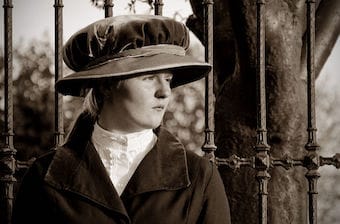One of the many ‘reenactors’ employed at Beamish Open Air Museum in County Durham, apparently lost in thought by the town gates. The museum recreates life in a northern industrial village in the Victorian and Edwardian eras. Young working class women were among the last to be granted the right to vote, in 1928.
THE Reform Act of 1832 had done sterling work, yet women were barred from voting, and property tests still excluded four in five men, especially those working men whose labour powered the economy.
In 1867, a new Act made fifty-three more seats available to densely populated areas, and property qualifications were relaxed to include skilled workers. Eligible men now touched one in three, increased to forty percent by further legislation in 1884. Women were still excluded by law.
But the sacrifices made by men and women of all backgrounds during the Great War, and a defiant Suffragette movement, showed that sex, age and wealth had little to do with responsible citizenship.
Consequently, the Representation of the People Act of 1918 enfranchised every man over twenty-one, regardless of economic status, and women over thirty who were ratepayers or married to ratepayers. The following year, Nancy Astor became the first female MP, and in 1928, women were granted voting rights on the same terms as men.
Précis
The Reform Act of 1832 had been a beginning, but keeping pace with industrial and demographic change required further action in 1867 and 1884. The Great War accelerated the recognition that people of all social and economic classes contributed to society as responsible citizens, and in 1928 this led Parliament to extend the franchise to all adult men and women. (60 / 60 words)
The Reform Act of 1832 had been a beginning, but keeping pace with industrial and demographic change required further action in 1867 and 1884. The Great War accelerated the recognition that people of all social and economic classes contributed to society as responsible citizens, and in 1928 this led Parliament to extend the franchise to all adult men and women.
Variations: 1.increase the length of this precis to exactly 65 words. 2.reduce the length of this precis to exactly 55 words. 3.introduce one of the following words into the precis: although, besides, despite, must, not, since, unless, whereas.
Archive
Word Games
Sevens Based on this passage
Suggest answers to this question. See if you can limit one answer to exactly seven words.
Variations: 1.expand your answer to exactly fourteen words. 2.expand your answer further, to exactly twenty-one words. 3.include one of the following words in your answer: if, but, despite, because, (al)though, unless.
Jigsaws Based on this passage
Express the ideas below in a single sentence, using different words as much as possible. Do not be satisfied with the first answer you think of; think of several, and choose the best.
Spinners Find in Think and Speak
For each group of words, compose a sentence that uses all three. You can use any form of the word: for example, cat → cats, go → went, or quick → quickly, though neigh → neighbour is stretching it a bit.
This exercise uses words found in the accompanying passage.
1 Decide. Not. People.
2 Bar. Married. Third.
3 Grow. Town. Wide.
Variations: 1. include direct and indirect speech 2. include one or more of these words: although, because, despite, either/or, if, unless, until, when, whether, which, who 3. use negatives (not, isn’t, neither/nor, never, nobody etc.)
High Tiles Find in Think and Speak
Make words (three letters or more) from the seven letters showing below, using any letter once only. Each letter carries a score. What is the highest-scoring word you can make?
Your Words ()
Post Box : Ask Nicholas
Grok : Ask Grok
You are welcome to share your creativity with me, or ask for help with any of the exercises on Clay Lane. Write to me at this address:
See more at Post Box.
If you like what I’m doing here on Clay Lane, from time to time you could buy me a coffee.
Buy Me a Coffee is a crowdfunding website, used by over a million people. It is designed to help content creators like me make a living from their work. ‘Buy Me a Coffee’ prides itself on its security, and there is no need to register.
Related Posts
A rowdy but good-humoured crowd gathered in St Peter’s Fields, Manchester, to protest against electoral malpractice and Government cronyism.
Picture: By Richard Carlile (1790–1843), Wikimedia Commons. Licence: Public domain.. Source.
Posted February 9 2021
Chinese merchant Lien Chi tells a colleague that English liberties have little to do with elections, taxes and regulations.
Picture: Pierre Prévost (1764–1823), via Wikimedia Commons. Licence: Public domain.. Source.
Posted August 13 2020
In a Christmas broadcast in 1940, actor Leslie Howard explained why British sovereignty was worth fighting for.
Picture: Photo by RKO Radio Pictures, via Wikimedia Commons. Licence: Public domain.. Source.
Posted June 6 2016






